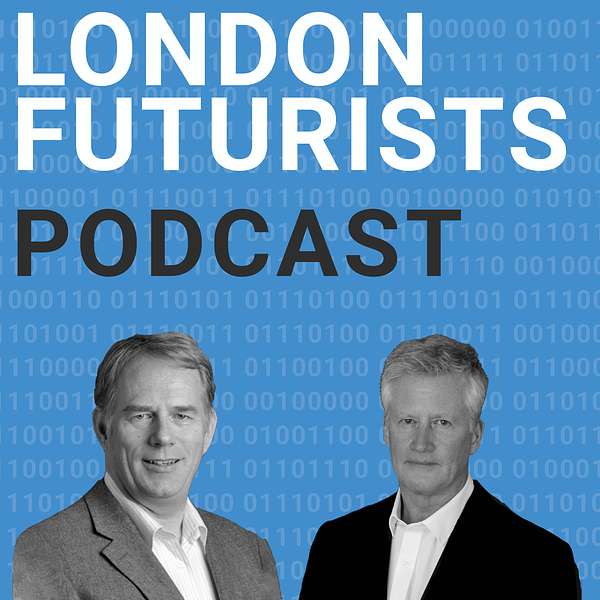
London Futurists
Anticipating and managing exponential impact - hosts David Wood and Calum Chace
Calum Chace is a sought-after keynote speaker and best-selling writer on artificial intelligence. He focuses on the medium- and long-term impact of AI on all of us, our societies and our economies. He advises companies and governments on AI policy.
His non-fiction books on AI are Surviving AI, about superintelligence, and The Economic Singularity, about the future of jobs. Both are now in their third editions.
He also wrote Pandora's Brain and Pandora’s Oracle, a pair of techno-thrillers about the first superintelligence. He is a regular contributor to magazines, newspapers, and radio.
In the last decade, Calum has given over 150 talks in 20 countries on six continents. Videos of his talks, and lots of other materials are available at https://calumchace.com/.
He is co-founder of a think tank focused on the future of jobs, called the Economic Singularity Foundation. The Foundation has published Stories from 2045, a collection of short stories written by its members.
Before becoming a full-time writer and speaker, Calum had a 30-year career in journalism and in business, as a marketer, a strategy consultant and a CEO. He studied philosophy, politics, and economics at Oxford University, which confirmed his suspicion that science fiction is actually philosophy in fancy dress.
David Wood is Chair of London Futurists, and is the author or lead editor of twelve books about the future, including The Singularity Principles, Vital Foresight, The Abolition of Aging, Smartphones and Beyond, and Sustainable Superabundance.
He is also principal of the independent futurist consultancy and publisher Delta Wisdom, executive director of the Longevity Escape Velocity (LEV) Foundation, Foresight Advisor at SingularityNET, and a board director at the IEET (Institute for Ethics and Emerging Technologies). He regularly gives keynote talks around the world on how to prepare for radical disruption. See https://deltawisdom.com/.
As a pioneer of the mobile computing and smartphone industry, he co-founded Symbian in 1998. By 2012, software written by his teams had been included as the operating system on 500 million smartphones.
From 2010 to 2013, he was Technology Planning Lead (CTO) of Accenture Mobility, where he also co-led Accenture’s Mobility Health business initiative.
Has an MA in Mathematics from Cambridge, where he also undertook doctoral research in the Philosophy of Science, and a DSc from the University of Westminster.
London Futurists
A tale of two cities: Riyadh and Dublin
Use Left/Right to seek, Home/End to jump to start or end. Hold shift to jump forward or backward.
Calum and David reflect on their involvement in two recent conferences, one in Riyadh, and one in Dublin. Each conference highlighted a potential disruption in a major industry: a country with large ambitions in the AI space, and a new foundation in the longevity space.
00.00 A tale of two cities, two conferences, two industries
00.44 First, the 2nd Saudi Global AI Conference
01.03 Vision 2030
01.11 Saudi has always been a coalition between the fundamentalist Wahhabis and the Royal Family
01.38 The King chooses reform in the wake of 9/11
02.07 Mohamed bin Salman appointed Crown Prince, who embarks on reform
02.28 The partial liberation of women, and the fundamentalists side-lined
03.10 The “Sheikhdown” in 2017
03.49 The Khashoggi affair and the Yemen war lead to Saudi being shunned
04.26 The West is missing what’s going on in Saudi
05.00 Lifting the Saudi economy’s reliance on petrochemicals
05.27 AI is central to Vision 2030
06.00 Can Saudi become one of the world’s top 10 or 15 AI countries?
06.20 The AI duopoly between the US and China is so strong, this isn’t as hard as you might think
06.55 Saudi’s advantages
07.22 Saudi’s disadvantages
07.54 The goal is not implausible
08.10 The short-term goals of the conference. A forum for discussions, deals, and trying to open the world’s eyes
09.45 Saudi is arguably on the way to becoming another Dubai. Continuation and success are not inevitable, but it is encouraging
11.00 Fastest-growth country in the G20, with an oil bonanza
11.25 The proposed brand-new city of Neom with The Line, a futuristic environment
13.07 The second conference: the Longevity Summit in Dublin
13.48 A new foundation announced
14.05 Reports updating on progress in longevity research around the world
14.20 A dozen were new and surprising. Four examples…
14.50 1. Bats. A speaker from Dublin discussed why they live so long – 40 years – and what we can learn from that
15.55 2. Parabiosis on steroids. Linking the blood flow of two animals suggests there are aging elements in our blood which can be removed
17.50 3. Using AI to develop drugs. Companies like Exscientia and Insilico. Cortex Discovery is a smaller, perhaps more nimble player
19.40 4. Hevolution, a new longevity fund backed with up to $1bn of Saudi money per year for 20 years
22.05 As Aubrey de Grey has long said, we need engineering as much as research
22.40 Aubrey thinks aging should be tackled by undoing cell damage rather than changing the human metabolism
24.00 Three phases of his career. Methuselah. SENS. New foundation
25.00 Let’s avoid cancer, heart disease and dementias by continually reversing aging damage
26.00 He is always itchy to explore new areas. This led to a power struggle within SENS, which he lost
27.00 What should previous SENS donors do now?
27.15 The rich crypto investors who have provided large amounts to SENS are backing the new foundation
28.30 One of the new foundation’s investment areas will be parabiosis
28.55 Cryonics will be another investment area
29.15 Lobbying legislators will be another
29.50 Robust Mouse Rejuvenation will be the initial priority
30.50 Pets may be the animal models whose rejuvenation breaks humanity’s “trance of death”
31.05 David has been appointed a director the new foundation
31.50 The other directors
33.05 An exciting future
Audio engineering by Alexander Chace.
Music: Spike Protein, b
Elevate how you lead with insight from today’s most influential executives.
Listen on: Apple Podcasts Spotify

